Goldsmith’s History of Rome came to me much later, but quite as immemorably, and after I had formed a preference for the Greek Republics, which I dare say was not mistaken. Of course I liked Athens best, and yet there was something in the fine behavior of the Spartans in battle, which won a heart formed for hero-worship. I mastered the notion of their communism, and approved of their iron money, with the poverty it obliged them to, yet somehow their cruel treatment of the Helots failed to shock me; perhaps I forgave it to their patriotism, as I had to forgive many ugly facts in the history of the Romans to theirs. There was hardly any sort of bloodshed which I would not pardon in those days to the slayers of tyrants; and the swagger form of such as despatched a despot with a fine speech was so much to my liking that I could only grieve that I was born too late to do and to say those things.
I do not think I yet felt the beauty of the literature which made them all live in my fancy, that I conceived of Goldsmith as an artist using for my rapture the finest of the arts; and yet I had been taught to see the loveliness of poetry, and was already trying to make it on my own poor account. I tried to make verses like those I listened to when my father read Moore and Scott to my mother, but I heard them with no such happiness as I read my beloved histories, though I never thought then of attempting to write like Goldsmith. I accepted his beautiful work as ignorantly as I did my other blessings. I was concerned in getting at the Greeks and Romans, and I did not know through what nimble air and by what lovely ways I was led to them. Some retrospective perception of this came long afterward when I read his essays, and after I knew all of his poetry, and later yet when I read the ‘Vicar of Wakefield’; but for the present my eyes were holden, as the eyes of a boy mostly are in the world of art. What I wanted with my Greeks and Romans after I got at them was to be like them, or at least to turn them to account in verse, and in dramatic verse at that. The Romans were less civilized than the Greeks, and so were more like boys, and more to a boy’s purpose. I did not make literature of the Greeks, but I got a whole tragedy out of the Romans; it was a rhymed tragedy, and in octosyllabic verse, like the “Lady of the Lake.” I meant it to be acted by my schoolmates, but I am not sure that I ever made it known to them. Still, they were not ignorant of my reading, and I remember how proud I was when a certain boy, who had always whipped me when we fought together, and so outranked me in that little boys’ world, once sent to ask me the name of the Roman emperor who lamented at nightfall, when he had done nothing worthy, that he had lost a day. The boy was going to use the story, in a composition, as we called the school themes then, and I told him the emperor’s name; I could not tell him now without turning to the book.




